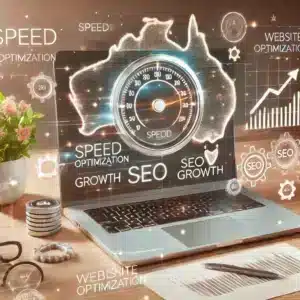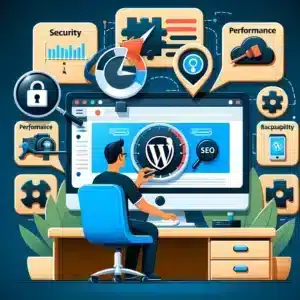

Security is perhaps the most important aspect of WordPress maintenance. Hackers are always on the lookout for vulnerabilities in websites, and WordPress sites are no exception. Outdated plugins, themes, or core software can provide an easy entry point for attackers. To keep your website secure, you must regularly update WordPress, plugins, and themes to their latest versions. Regular updates can patch security holes, fix bugs, and ensure that your website remains protected against potential threats.
Additionally, you can take other measures to improve your website’s security, such as installing a security plugin like WordFence, which can help you monitor your website’s security, block malicious traffic, and prevent brute-force attacks. You can also use strong passwords, two-factor authentication, and limit login attempts to further enhance your website’s security.
Website performance is another critical aspect of WordPress maintenance. A slow-loading website can hurt your user experience, and it can even negatively affect your search engine ranking. WordPress is a complex platform, and over time, your website can become cluttered with unnecessary files, images, and plugins. This can slow down your website’s speed and make it difficult for users to navigate. To improve website performance, you should regularly optimize your website’s database, compress images, and remove unused plugins and themes.
You can also use caching plugins, like W3 Total Cache or WP Super Cache, to improve website speed. These plugins can help reduce server load, optimize website code, and store website data in a cache, which can reduce page load times significantly.
WordPress is an open-source platform that allows developers to create plugins and themes that can extend their functionality. However, not all plugins and themes are compatible with the latest version of WordPress. This can result in errors, broken functionality, or even a complete website crash. To avoid compatibility issues, you should always update WordPress, plugins, and themes to their latest versions. You should also test your website thoroughly after each update to ensure that everything is working correctly.
Regular backups are essential for any website. They help you recover your website’s data in case of a disaster, such as a website hack, server crash, or accidental deletion of files. You should always create backups of your website’s database, files, and media regularly. You can use plugins like UpdraftPlus or BackupBuddy to automate the backup process and store backups in the cloud or on a remote server.
Search engine optimization (SEO) is another crucial aspect of WordPress maintenance. A well-optimized website can help you rank higher in search engine results, attract more traffic, and increase your website’s visibility. To improve your website’s SEO, you should optimize your website’s content, metadata, and images. You should also use plugins like Yoast SEO or All in One SEO Pack to help you optimize your website’s SEO.
The user experience is perhaps the most crucial aspect of website maintenance. A website that’s difficult to navigate, slow to load, or unresponsive can negatively impact your user experience. You should regularly test your website for usability and make sure that it’s easy to navigate, and all links are working correctly. You should also ensure that your website is responsive and mobile-friendly, as more and more users are browsing the internet on their mobile devices.
To improve your website’s user experience, you can take several steps. First, you can conduct regular user testing to identify any usability issues that users may be facing. You can also use heat maps and analytics tools to understand how users are interacting with your website and identify any pain points.
Another way to improve your website’s user experience is by optimizing your website’s design. A well-designed website can improve your website’s navigation, increase engagement, and reduce bounce rates. You should ensure that your website’s design is consistent, easy to read, and visually appealing. You can also use plugins like Elementor or Divi to create custom layouts and design elements that are unique to your website.
Finally, you can use plugins like Jetpack or Smush to optimize your website’s images and videos. Large media files can slow down your website’s speed and negatively impact your user experience. These plugins can compress your media files without compromising their quality, reducing load times and improving your website’s performance.
In conclusion, WordPress maintenance is crucial for the security, performance, compatibility, backup and recovery, SEO, and user experience of your website. Regularly updating WordPress, plugins, and themes, optimizing your website’s database and media files, conducting user testing, and ensuring that your website is mobile-friendly can help you create a website that’s secure, fast, and user-friendly. By maintaining your website regularly, you can ensure that your website remains relevant and competitive in the ever-evolving digital landscape.